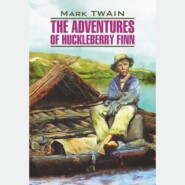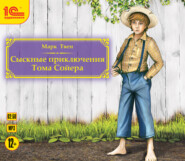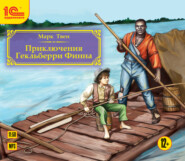По всем вопросам обращайтесь на: info@litportal.ru
(©) 2003-2025.
✖
A Tramp Abroad
Автор
Год написания книги
2015
Настройки чтения
Размер шрифта
Высота строк
Поля
The Lorelei
Translated by L. W. Garnham, B.A.
I do not know what it signifies.
That I am so sorrowful?
A fable of old Times so terrifies,
Leaves my heart so thoughtful.
The air is cool and it darkens,
And calmly flows the Rhine;
The summit of the mountain hearkens
In evening sunshine line.
The most beautiful Maiden entrances
Above wonderfully there,
Her beautiful golden attire glances,
She combs her golden hair.
With golden comb so lustrous,
And thereby a song sings,
It has a tone so wondrous,
That powerful melody rings.
The shipper in the little ship
It effects with woe sad might;
He does not see the rocky slip,
He only regards dreaded height.
I believe the turbulent waves
Swallow the last shipper and boat;
She with her singing craves
All to visit hermagic moat.
No translation could be closer. He has got in all the facts; and in their regular order, too. There is not a statistic wanting. It is as succinct as an invoice. That is what a translation ought to be; it should exactly reflect the thought of the original. You can’t sing “Above wonderfully there,” because it simply won’t go to the tune, without damaging the singer; but it is a most clingingly exact translation of Dort OBEN wunderbar—fits it like a blister. Mr. Garnham’s reproduction has other merits – a hundred of them – but it is not necessary to point them out. They will be detected.
No one with a specialty can hope to have a monopoly of it. Even Garnham has a rival. Mr. X had a small pamphlet with him which he had bought while on a visit to Munich. It was entitled A catalogue of pictures in the old PINACOTEK, and was written in a peculiar kind of English. Here are a few extracts:
“It is not permitted to make use of the work in question to a publication of the same contents as well as to the pirated edition of it.”
“An evening landscape. In the foreground near a pond and a group of white beeches is leading a footpath animated by travelers.”
“A learned man in a cynical and torn dress holding an open book in his hand.”
“St. Bartholomew and the Executioner with the knife to fulfil the martyr.”
“Portrait of a young man. A long while this picture was thought to be Bindi Altoviti’s portrait; now somebody will again have it to be the self-portrait of Raphael.”
“Susan bathing, surprised by the two old man. In the background the lapidation of the condemned.”
("Lapidation” is good; it is much more elegant than “stoning.”)
“St. Rochus sitting in a landscape with an angel who looks at his plague-sore, whilst the dog the bread in his mouth attents him.”
“Spring. The Goddess Flora, sitting. Behind her a fertile valley perfused by a river.”
“A beautiful bouquet animated by May-bugs, etc.”
“A warrior in armor with a gypseous pipe in his hand leans against a table and blows the smoke far away of himself.”
“A Dutch landscape along a navigable river which perfuses it till to the background.”
“Some peasants singing in a cottage. A woman lets drink a child out of a cup.”
“St. John’s head as a boy – painted in fresco on a brick.” (Meaning a tile.)
“A young man of the Riccio family, his hair cut off right at the end, dressed in black with the same cap. Attributed to Raphael, but the signation is false.”
“The Virgin holding the Infant. It is very painted in the manner of Sassoferrato.”
“A Larder with greens and dead game animated by a cook-maid and two kitchen-boys.”
However, the English of this catalogue is at least as happy as that which distinguishes an inscription upon a certain picture in Rome – to wit:
“Revelations-View. St. John in Patterson’s Island.”
But meanwhile the raft is moving on.
Chapter XVII
A mile or two above Eberbach we saw a peculiar ruin projecting above the foliage which clothed the peak of a high and very steep hill. This ruin consisted of merely a couple of crumbling masses of masonry which bore a rude resemblance to human faces; they leaned forward and touched foreheads, and had the look of being absorbed in conversation. This ruin had nothing very imposing or picturesque about it, and there was no great deal of it, yet it was called the “Spectacular Ruin.”
Legend of the “Spectacular ruin.”
The captain of the raft, who was as full of history as he could stick, said that in the Middle Ages a most prodigious fire-breathing dragon used to live in that region, and made more trouble than a tax-collector. He was as long as a railway-train, and had the customary impenetrable green scales all over him. His breath bred pestilence and conflagration, and his appetite bred famine. He ate men and cattle impartially, and was exceedingly unpopular. The German emperor of that day made the usual offer: he would grant to the destroyer of the dragon, any one solitary thing he might ask for; for he had a surplusage of daughters, and it was customary for dragon-killers to take a daughter for pay.
So the most renowned knights came from the four corners of the earth and retired down the dragon’s throat one after the other. A panic arose and spread. Heroes grew cautious. The procession ceased. The dragon became more destructive than ever. The people lost all hope of succor, and fled to the mountains for refuge.
At last Sir Wissenschaft, a poor and obscure knight, out of a far country, arrived to do battle with the monster. A pitiable object he was, with his armor hanging in rags about him, and his strange-shaped knapsack strapped upon his back. Everybody turned up their noses at him, and some openly jeered him. But he was calm. He simply inquired if the emperor’s offer was still in force. The emperor said it was – but charitably advised him to go and hunt hares and not endanger so precious a life as his in an attempt which had brought death to so many of the world’s most illustrious heroes.
But this tramp only asked—“Were any of these heroes men of science?” This raised a laugh, of course, for science was despised in those days. But the tramp was not in the least ruffled. He said he might be a little in advance of his age, but no matter – science would come to be honored, some time or other. He said he would march against the dragon in the morning. Out of compassion, then, a decent spear was offered him, but he declined, and said, “spears were useless to men of science.” They allowed him to sup in the servants’ hall, and gave him a bed in the stables.
When he started forth in the morning, thousands were gathered to see. The emperor said:
“Do not be rash, take a spear, and leave off your knapsack.”
But the tramp said:
“It is not a knapsack,” and moved straight on.
The dragon was waiting and ready. He was breathing forth vast volumes of sulphurous smoke and lurid blasts of flame. The ragged knight stole warily to a good position, then he unslung his cylindrical knapsack – which was simply the common fire-extinguisher known to modern times – and the first chance he got he turned on his hose and shot the dragon square in the center of his cavernous mouth. Out went the fires in an instant, and the dragon curled up and died.
This man had brought brains to his aid. He had reared dragons from the egg, in his laboratory, he had watched over them like a mother, and patiently studied them and experimented upon them while they grew. Thus he had found out that fire was the life principle of a dragon; put out the dragon’s fires and it could make steam no longer, and must die. He could not put out a fire with a spear, therefore he invented the extinguisher. The dragon being dead, the emperor fell on the hero’s neck and said:

















